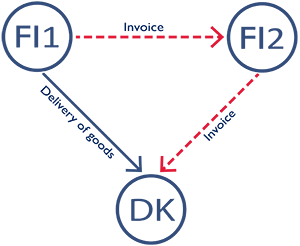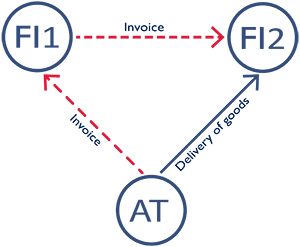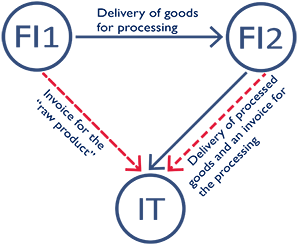Who provides Intrastat information?
The company's Intrastat contact person
- takes care of sending Intrastat declarations.
- receives reminding letters if Intrastat declarations are not submitted in time.
- receives statistical inquiries concerning suspected errors in Intrastat declarations.
- receives requests for clarification in case of value differences between the company's Intrastat declarations and EU sales of goods (VAT declarations) reported to the Tax Administration.
We will contact the company primarily by email. Please make sure that the contact information is up-to-date in the future as well, so that communication is smooth. Report changes to Intrastat(at)tulli.fi.
The information providers are companies involved in intra-EU trade and who have a Business ID. For each calendar year, every Member State shall define a statistical threshold limit based on the value of the annual dispatches. This limit shall be specified by each Member State so that as many of the smallest exporters as possible are exempt from submitting statistical declarations while the quality standard of the statistics still remains adequate. Data of the internal trade of companies exempt from reporting is estimated and added to statistics in all CN-classes every month.
The obligation to submit declarations is defined according to those total values of the intra-Community sales that the seller of the goods declares to the tax authorities in the tax return.
Once a month the Tax Administration provides Customs with data on the total values of company-specific sales within the internal trade (section Sales of goods to other EU Member States in the self-assessed tax return 4001e), on which basis the commencement of the obligation to provide information is defined during the statistical year. This data are also used in the production of statistics for control purposes in monitoring the realization of the company's obligation to provide information.
The threshold value in 2025 was EUR 800 000 for dispatches.
(In 2025 the threshold value of the obligation to provide statistical declarations for arrivals was EUR 800 000. If the value of the company´s EU-acquisitions during the calendar year, the company was obliged to submit statistical declarations for its arrivals. More information on page Annual changes.)
If the value of the dispatches exceeds the statistical threshold, calculated from the beginning of the calendar year, a notification of the commencement of the obligation to provide information is sent to the company. Thus the company need not monitor whether the threshold is possibly exceeded. In practice, the obligation to provide information commences with the month following the notification, or the month after that. After this the obligation is in force without interruption. The Intrastat declaration shall be submitted by the 10th working day of the month following the statistical reference month. The due dates are on page The due dates for submitting Intrastat declarations.
The responsibility for providing Intrastat information
The parties responsible for reporting the statistical data for dispatches are specified in the Commission Implementing Regulation (EU) 2020/1197
(Annex V, Chapter I, Sections 6 and 7) EUR-Lex - 32020R1197 - EN - EUR-Lex (europa.eu).
The primary responsibility for providing the information lies with the party having incurred the contract (transport agreement excluded) concerning the delivery (dispatches) of goods (see examples 1, 2 and 3).
The secondary responsibility lies with the consignor when dispatches are concerned, or with the party retaining the goods to be dispatched (see example 4).
The Finnish company FI sells goods to the Swedish company SE, and FI also delivers the goods directly to SE.
This is so-called normal trade, in which the seller also delivers the goods directly to the buyer. FI includes these deliveries of goods in it's statistical declaration.

The Finnish company FI 1 sells (Finnish invoice including VAT) goods to another Finnish company, FI 2, and FI 2 sells (intra-Community supply) the goods further to the Danish company DK. The goods are delivered directly from FI 1's warehouse to DK in Denmark.
FI 2 includes these deliveries of goods in its Intrastat declaration, although the goods were physically sent directly from FI 1's warehouse.

The Finnish company FI 1 buys (intra-Community acquisition) goods from the Austrian company AT and sells (Finnish invoice including VAT) them further to another Finnish company, FI 2. The goods are delivered directly from Austria to FI 2 in Finland.
FI 1 includes these deliveries of goods in its Intrastat declaration, although the goods were physically sent directly to FI 2.

The Finnish company FI 1 sells “raw products'' to the Italian company IT , and the goods are delivered to another Finnish company, FI 2, for processing. After the processing FI 2 delivers the goods to IT in Italy.
In order to avoid reporting the same statistical data twice, both Finnish companies cannot include the goods in question in their statistical declaration. FI 2 includes these deliveries of goods in its Intrastat declaration since it retains the goods to be consigned.
NB! The value of the processed goods is the value of the raw product + processing costs. The value of the raw product is the price which would be invoiced for the product in the event of a normal purchase or sale.

Failure to comply with the obligation to provide information
Failure to submit data within the set time limit causes a delay in the publishing of statistics.
The Commission Implementing Regulation on European business statistics calls for nationally stipulated sanctions for failure to provide statistical information, (EU) 2020/1197 (Annex V, Section 8) EUR-Lex - 32020R1197 - EN - EUR-Lex (europa.eu).
In Finland, the failure to submit the Intrastat declaration is regulated in the Customs Act (304/2016) 96 § subsection 1 point 3. A surcharge for fault is imposed if statistical data has not been submitted within the time prescribed. The surcharge for fault is imposed monthly, separately for each failure. The surcharge for fault may also be imposed if inaccurate data is submitted intentionally.
At the request of the company, Customs Statistics may also provide reporting unit codes (INT codes) to be used in the internal trade. These codes are added after the VAT number. This method is most often used in cases where the company has offices in different locations and each office wants to submit a statistical declaration of their own, due to practical reasons. Removals and additions of the obligation to provide information, however, are always based on the dispatches of the whole company.
The party obliged to provide information may partly or completely have the statistical declaration done by an agent. The agent's tasks may also be split up between several agents. The responsibility for sending the data and for the accuracy of the data, however, always remains with the party obliged to provide information (The Commission Implementing Regulation (EU) 2020/1197, Annex V, Chapter 1, Section 8) EUR-Lex - 32020R1197 - EN - EUR-Lex (europa.eu).
If the company uses an agent for making the declaration, details relating to the agent must be given to Customs Statistics via e-mail: intrastat(at)tulli.fi (name, address, telephone number, e-mail address, contact person, VAT code).
The agent may also supply this information personally to Customs Statistics.
Distance selling is the sale of goods transported to private individuals or their assimilated buyers. When the purchaser of the goods is a trader registered for VAT purposes, there is no distance sale of the goods. In this case, the sale of goods transported to another EU country is usually an intra-Community sale and a purchase from another EU country is an intra-Community acquisition.
The obligation of a company engaged in distance selling to provide information on internal sales within the EU is defined according to the same general principles that apply to others subject to the obligation to provide information, i.e. when the threshold value set for the respective calendar year is exceeded.
If a company registers in the OSS system in another member state and the company's business ID is terminated in Finland (the company no longer has a Finnish business ID), the company must contact Customs Statistics at intrastat@tulli.fi in order to terminate the Intrastat reporting obligation.
VAT special scheme (One Stop Shop)
- Under special schemes, the seller can pay VAT on the sale of goods and services to consumers throughout the EU through a single EU country.
- A seller who does not use special schemes will be registered for VAT in those EU countries where it has sales to consumers.
- Special VAT systems are in place in all EU countries. As VAT obligations can be managed centrally in one EU country, the use of a special scheme will reduce the administrative burden for businesses trading cross-border.
Read more from the Finnish Tax Administration´s website VAT special scheme (One Stop Shop) - vero.fi.
If a company's VAT number is modified due to a change of ownership, name, locality, legal status or any similar change, the company is still subject to the same statistical obligations as before the change. Changes of the VAT number or other changes relating to the obligation to provide information, e.g. the cessation of activity, must be reported to Customs Statistics by e-mail: intrastat(at)tulli.fi.
If there is a change of address and/or contact person in the company, this should be reported to Customs Statistics by e-mail: intrastat(at)tulli.fi.
In order to be able to respond to possible enquiries on statistics, the data in the statistical declarations should be preserved for at least two years after the end of the year of compilation. Due to practical reasons Customs Statistics recommends that both the statistical data of the current year and the data from the two previous whole calendar years are preserved.
Customs Statistics may send the party obliged to submit declarations or the agent that this party uses an enquiry concerning the accuracy of the declared data. As a rule, the enquiries are sent within two months after the expiry of the statistical period, but enquiries may also be sent until 15 August of the year following the year of compilation. In special cases, enquiries may be made within a period of two years after the expiry of the year of compilation (for example the Eurostat enquiry).
Customs Statistics monitors whether the companies comply with their obligation to provide information by comparing value data on VAT obtained from the tax authorities with the value data of the statistical declarations. The comparison is made every month and quarterly. If the declared total values diverge significantly, Customs sends a request for clarification to the company.
Certain deliveries of goods are not entered as intra-Community supplies or acquisitions in the VAT return. These include goods delivered for processing under contract (transaction codes 41, 42, 51 and 52) and repair (code 60), which are returned after the activity in question. These deliveries shall, however, be included in the Intrastat declaration. This way there is a difference between the Intrastat declaration and the VAT return. The transaction code indicates that this difference is acceptable, and no request for clarification will be sent.
Removals from the register on information providers are implemented every spring on the basis of the VAT and statistical data on the whole previous year. In this process, the obligations of those companies falling below the threshold to report on dispatches are discontinued. The companies concerned shall be informed of this in writing. If a company’s VAT and statistical values for the whole year remain under the threshold value, but the obligation to provide information started in the middle of the year, the company will not be removed from the register the following year.
If the company's activities change, for example if there is a total termination of business, the obligation to provide information may be discontinued even outside the yearly removals. In such cases the company is advised to contact Customs Statistics by e-mail: intrastat(at)tulli.fi.